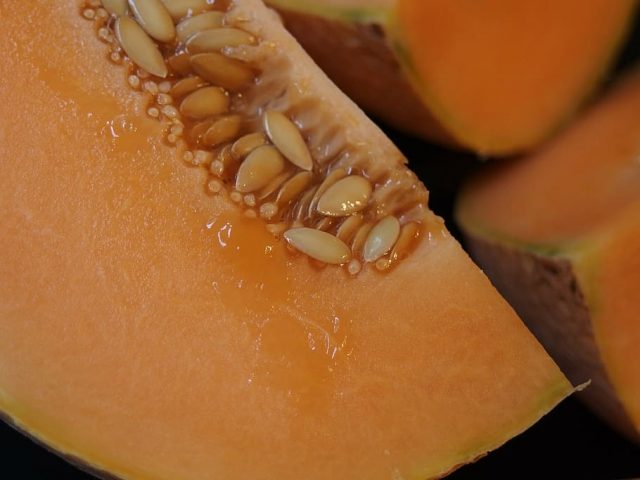We are reader-supported & may earn a small commission at no extra cost to you, when you buy through links on this site. This helps us to provide you with free and helpful content. The content of this site is informational only & is no substitute for medical advice, diagnosis or treatment. Always seek the advice of a doctor before using any of the information/products mentioned on this site.
Table of Contents
Cantaloupe Calories: Good For Weight Loss?

You might have wondered whether cantaloupe calories are too high to be suitable for your weight loss regimen.
The Good News is, cantaloupe is not only low in calories but provides a multitude of important nutrients and is made up mainly of water (about 85%).
Considering cantaloupe in your diet is an ideal way to keep your body hydrated. But this yummy bright orange fruit has a lot more to offer.
Cantaloupe Calories: Nutritional Info
Below you can find the nutritional information provided by the USDA for 1 cup (approximately 175g) of raw cantaloupe.
- Calories: 59
- Fat: 0.2g
- Carbohydrates: 14.3g
- Sodium: 27mg
- Sugars: 13g
- Fiber: 1.5g
- Protein: 1.4g
>> UGLY Plant [Featured On Dr. Oz] Made This Mother Lose A Jaw-Dropping 59 Pounds. Click HERE To See Her Testimony <<
Cantaloupe Carbohydrates
As shown above, 1 cup of fresh cantaloupe comes with about 60 calories, which are primarily made up from carbohydrates. One cup of cantaloupe has a total of 14.3 grams of carbohydrates (14 grams natural sugar and about 1.5 grams of fiber).
Cantaloupe is in mid-range for glycemic index with a score of 65. However, its glycemic load is only 4, due to cantaloupes high water content and low calories.
Cantaloupe Fats
There is an unsignificant amount of fat in cantaloupe, like in most fruits.
Cantaloupe Protein
With only 1.5 grams per one cup, cantaloupe´s protein content is also, like with most fruits, insignifcant.
Micronutrients and Minerals
Cantaloupe is a good source of calcium, magnesium, potassium, vitamins C,A, B9 and phosphorus.
Cantaloupe Health Related Benefits
Cantaloupe comes with many proven health related benefits, thanks to its electrolyte, antioxidant and water content.
Cantaloupe Provides Fluid
Fruits high in water like cantaloupe and melons in general will help you stay hydrated, especially in the summertime, where there is a greater need to rehydrate in regular intervals.
Also, its electrolyte content will help your body to replenish important minerals, you lost by sweating or urinating. A good way to check if you are properly hydrated is to check the color of your urine. If your urine happens to be amber-colored or dark yellow, you may need more fluid. Your urine should be pale yellow.
Cantaloupe Is Good For Your Eyes
Cantaloupe is a top source of beta carotene, which has shown to support eye health. Beta carotene is responsible for the bright orange coloring of carrots, cantaloupes and pumpkins.
More so, cantaloupe also contains zeaxanthin and lutein, two nutrients of the vitamin A family which are known to prevent macular degeneration.
May Reduce Risk of Developing Cancer
Studies have found that cantaloupe extract prevented the growth of human tumor cells. Fruits high in antioxidants are helping to neutralize free radicals before they cause damage.
May Help In Lowering Blood Pressure
Cantaloupe is high in potassium and low in sodium, with one cup of raw untreated cantaloupe offering 472 milligrams of potassium.
Potassium has shown to have beneficial effects for heart health and blood pressure.
Allergic Potential Of Cantaloupe
Individuals with OAS (oral allergy syndrome) may experience allergic reactions when consuming cantaloupe, especially if the individual has a grass allergy.
Symptoms can express in swelling of the mouth, lip, throat, face and in experiencing itchiness.
Different Varieties of Cantaloupe
We differ between two main varieties of these fruits. European cantaloupe on one side and North American cantaloupe on the other side.
They both come with a similar brightness of color and taste, but have a slight different pattern on the rind. Cantaloupe seeds are edible and popular among middle-eastern and latin-american cultures.
Choosing The Right Fruit
Choosing the right cantaloupe is not that easy. You can buy a ripe fruit for immediate use, or one that need to ripe further at home.
If you want to choose a ripe cantaloupe for immediate use, pay attention to these three things:
- Bottom End: This is the “south pole” of cantaloupes. Take a sniff at this part, it should smell somewhat fruity and is slightly soft when you press it. If there is hardly any fragrance and rock hard, its probably not a ripe fruit
- Color: Green is an indication of unripeness. Ripe cantaloupes comes with a light orange skin coloring.
- Front End: This is the “north pole” of cantaloupes. It should come with a rounded smooth scar, from its stem removal.
These fruits will continue to ripe for a couple of days after you´ve buyed them. Hard and fragrance lacking cantaloupes may are not ripe enough and will lack its typical flavor.
Don´t purchase fruits with nicks or soft spots. Melons which are not fully ripe, should be stored at room temperature for a couple of days.
Food Hygiene
Always wash the cantaloupe before you cut it. It is sufficient to wash it with warm tap water and a brush. Don´t wash cantaloupes with soap, to prevent soap entering the flesh of the fruit.
Due to cantaloupes growing close to ground, it can come into contact with bacteria from soil and animals. This is a potential concern of hygiene and safety. Also human contamination can occur during or after harvest, so make sure to clean these fruits properly, before eating them.
Preparation Ideas
Cantaloupe calories makes it a perfect food choice in many recipes. These sweet, bright and seducing fruits can be used in salads, in your morning bowl of cereal, your fat-free yogurt or in healthy home-made smoothies.
Cantaloupe wrapped in thin serrano ham, is a popular finger-food snack and appetizer across Europe, which you definitely should try, if you haven´t before.

Cantaloupe Calories: Conclusion
Cantaloupe is a tasty fruit, which is low in calories and provides a wide variety of health benefits. Although, they are high in water, you need to watch out for its sugar content!
You should always keep an eye on your carbohydrate intake with the help of a good diet plan like The Custom Keto Diet, which allows you to eat certain foods without losing control of excess carb intake.
Do you enjoyed our article on Cantaloupe calories? Let us know in the comments below!

Dear Reader, have you enjoyed reading this article? Since 2020, we dedicate ourselves to help people all over the world to achieve their weight loss goals. Over the course of these years many of our readers have contacted us to tells us about their weight loss progress. This is what keeps us going. If you found this article useful, please consider sharing it.
Thank you – Your WLJ-Team
Greetings,
Your WLJ-Team




